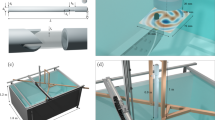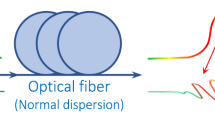Abstract
POLARIZED light has been used for determining the propagation of stress waves in solids for some time. We have employed it to study the propagation of stress waves in glass and plastics and have found what we believe to be evidence of new supersonic phenomena. The experimental arrangement follows classical lines, using ‘Polaroids’ and quarter-wave plates that give circularly polarized light through the transparent sample. For illumination, we used a 1530 PI discharge tube (General Radio) with an effective flash duration of 2 µsec. The transparent sample was loaded by exploding small amounts of lead azide with an electric ‘bridge’. The timing between the flash and the explosion was achieved by a suitable electric timer which allowed a variation of the delay from zero to 30 µsec. It is well known that shock loading causes a compressional and a shear wave to be propagated in the material, both of which essentially follow the so-called Huygens construction.
This is a preview of subscription content, access via your institution
Access options
Subscribe to this journal
Receive 51 print issues and online access
$199.00 per year
only $3.90 per issue
Buy this article
- Purchase on Springer Link
- Instant access to full article PDF
Prices may be subject to local taxes which are calculated during checkout
Similar content being viewed by others
Author information
Authors and Affiliations
Rights and permissions
About this article
Cite this article
PHILIPPOFF, W. New Supersonic Phenomena. Nature 182, 1011–1012 (1958). https://doi.org/10.1038/1821011b0
Issue Date:
DOI: https://doi.org/10.1038/1821011b0
Comments
By submitting a comment you agree to abide by our Terms and Community Guidelines. If you find something abusive or that does not comply with our terms or guidelines please flag it as inappropriate.



